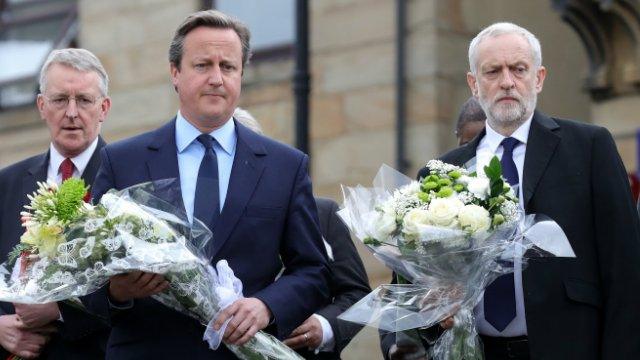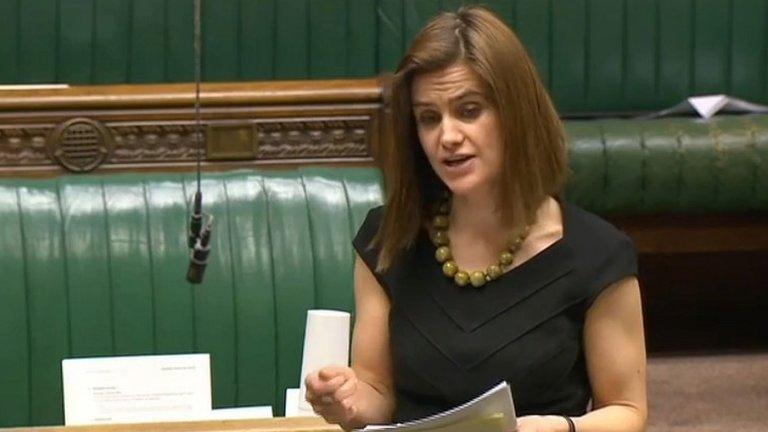Week ahead
- Published
- comments

After the dizzying pace of events at Westminster in the three weeks since the referendum, exhausted MPs and peers are rather tottering to the end of term on Thursday.
But before they depart, there are a couple of major events lurking in the final week - the big one is the vote on building four new Trident submarines, to extend the life of Britain's nuclear deterrent.
The second is the launch of an attempt to punish Tony Blair (see Monday).
With the referendum over and a new prime minister in place, some oven-ready government announcements may be heated up and presented to Parliament. For some weeks the usual grid of major events set by Downing Street has been missing from the normal pattern of politics, so may long-awaited announcements like the details of the Childhood Obesity Strategy finally be unveiled?
Here's my rundown of the week ahead:
Monday
The Commons opens (2.30 pm) with Communities and Local Government questions, including topical questions - the new secretary of state Sajid Javid debuts. Any urgent questions or ministerial statements will follow at 3.30pm
Then watch out for an attempt to get a "Privilege Motion" against former prime minister Tony Blair debated. The SNP's Alex Salmond has been gathering signatures, although the appointment of one of his key backers, David Davis, to the Cabinet has provided a setback.
Look out for a motion with a carefully balanced list of signatories, including MPs from both Labour factions and respected Tory backbenchers. If Mr Speaker gives his consent the result will be a three hour debate on Tuesday - probably on a motion calling on the Commons Privileges Committee to investigate whether the former PM misled Parliament in the run-up to the Iraq invasion.
Then comes the Trident replacement vote, on a motion to endorse the government's view that:
"the UK's independent minimum credible nuclear deterrent, based on a Continuous at Sea Deterrence posture, will remain essential to the UK's security today as it has for over 60 years, and for as long as the global security situation demands, to deter the most extreme threats to the UK's national security and way of life and that of the UK's allies; supports the decision to take the necessary steps required to maintain the current posture by replacing the current Vanguard Class submarines with four Successor submarines..."
The SNP will oppose, and Labour will have a free vote.
There are opportunities to rubber-stamp the draft Pubs Code Regulations 2016, and the Halton, Knowsley, Liverpool, St Helens, Sefton and Wirral Combined Authority (Election of Mayor) Order 2016.
The adjournment on the reform of surrogacy law is led by the Conservative Andrew Percy.
He wants to reform the legal framework for agreements between parents and surrogate mothers, to give them more stability, in the wake of a recent court ruling that allowed a surrogate mother to keep the child she was beating on behalf of a couple - the danger of this kind of thing is forcing parents to make arrangements abroad in places like Mexico and Nepal - often paying fees and running into legal troubles there.
With surrogacy increasingly popular but still carting a stigma Mr Percy wants to see if ministers can be persuaded to sound more approving... Health Minister Jane Ellison to answer.
In Westminster Hall from 4.30 pm-7.30pm, there's a debate on e-petition 131167, external on student loans - the petition notes that in 2010, the government promised that from April 2017 the Student Loans repayment threshold of £21,000 would be upped each year with average earnings, and complains that it has backtracked on this promise, freezing the threshold at £21,000, so graduates will now pay more on their student loans.
In the Lords (from 2.30pm) the half hour of questions to ministers will be followed by the second reading of the Policing and Crime Bill - which covers collaboration between the emergency services; handling of police complaints, police conduct, super-complaints about policing and the investigation of concerns about policing raised by whistle-blowers.
Then peers debate two orders to set up new super councils with elected Mayors - in Barnsley, Doncaster, Rotherham and Sheffield Combined Authority, and the West Midlands.
Tuesday
The Commons opens (11.30am) with Treasury questions - and yet another debut as Phillip Hammond has his first appearance in his new job.
Labour MP Ruth Cadbury will present a Ten Minute Rule Bill to allow taxpayers to self-certify a conscientious objection to public spending on defence and place a duty on the Treasury to take account of the amount and proportion of such self-certified income tax income in preparing the supply estimates.
(And if the Privilege Motion is accepted on Monday, a three hour debate on the case of Tony Blair will follow - probably immediately after Question Time).
Then MPs turn to the second reading of the Higher Education and Research Bill, external - this was prepared in Sajid Javid's BIS department; he's moved on and higher education's been transferred to the Education Department under Justine Greening.....
The bill makes it easier for new high-quality providers to start up and achieve degree awarding powers, and secure university status; creates a new student-focused regulator, the Office for Students - OfS; and creates a single research and innovation funding body, United Kingdom Research and Innovation - UKRI.
The adjournment is on cockling in the Dee Estuary led by Labour's Margaret Greenwood.
In Westminster Hall there are debates on persecution of religious minorities in the Middle East (9.30am-11am); the future of Channel 4 (11am-11.30am); the contribution of Poles to UK society (2.30pm- 4pm); squash and the Olympic Games (4pm-4.30pm); and the implications of the UK leaving the EU for the UK-Ireland border (4.30-5.30pm).
Committee hearing of the day (2.30pm) is with Wales Secretary Alun Cairns, who appears before the Welsh Affairs Committee to talk Brexit, the steel industry and the Wales Bill. This will be his committee debut as secretary of state.
In the Lords (2.30pm) peers begin with their usual half hour of questions before turning to the detail of the Investigatory Powers Bill with the third committee stage day of six. This will cover authorisation for obtaining communications data, retention of communications data, equipment interference and oversight arrangements.
Then peers will be asked to approve the Draft Carbon Budget Order 2016 and the Draft Climate Change Act 2008 (Credit Limit) Order 2016.
Wednesday
The Commons meets at 11.30 am - this time it's the new Northern Ireland Secretary James Brokenshire who makes his Question Time debut - followed by the big one - Theresa May's first outing at PMQs. Will it be sonorous formalities or bare-knuckle confrontation? Both the PM and the Leader of the Opposition will have something to prove.
Tributes to David Cameron at final Prime Minister's Questions
The Green MP Caroline Lucas has a Ten Minute Rule Bill to introduce proportional representation for elections for MPs and reduce the voting age to 16 in all UK elections and referendums.
The main debate is on an Opposition motion to be announced, and the adjournment is on the planning regime for beach huts - led by the Conservative, Christopher Chope.
In Westminster Hall, MPs debate the effect of the EU referendum on Gibraltar (9.30am-11am); reform of the Commons supply and estimates procedure (the means by which MPs are supposed to control the flow of taxpayers' money) (11am-11.30am); government policy on a Citizens' Convention on democracy - the initiative pushed by Labour MP Graham Allen (2.30pm-4pm); the development of the Flag Fen Bronze Age Park in Peterborough (4pm-4.30pm) and the prevention of online child abuse.
My committee pick of the day is the Environment Food and Rural Affairs hearing on future flood prevention with Matt Wrack of the Fire Brigades Union, and the Floods Minister Rory Stewart (2pm).
In the Lords (3pm), the main event is the final committee stage day on the Bus Services Bill, which will focus on powers to make traffic regulation orders, information about English bus services and the registration of bus services.
And there's a Labour "Regret Motion" against the First-tier Tribunal, Upper Tribunal and Employment Tribunals Fees (Amendment) Order 2016.
Thursday
The Commons final day before the summer break begins (9.30am) with a rare question time with a familiar face: the Attorney General, Jeremy Wright, has not been moved. On the other hand, Justine Greening is back in a new role taking questions as the minister for Women and Equalities,

The House of Lords will be debating the outcome of the EU referendum for farmers and the NHS
The main debates are both organised by the Backbench Business Committee - first Labour's Jim Dowd, with a debate on a motion on a ban on the manufacture, sale, possession and use of snares.
That's followed by a general debate on matters to be raised before the forthcoming adjournment - a rather amorphous occasion in which MPs can make a speech about pretty much anything.
In the Lords from 11am, there's a bit of housekeeping, with motions to implement the recommendations of the report from the Leader's Group on Governance of Domestic Committees in the House of Lords.
Then peers debate the conditions in which Palestinian children are living and the impact on their health and wellbeing; the impact of the decision to leave the European Union on British farmers, and the implications of the EU referendum result for government policies on ensuring safe staffing levels in the National Health Service and social care services.
- Published17 June 2016

- Published17 June 2016
